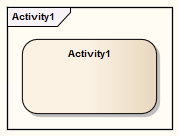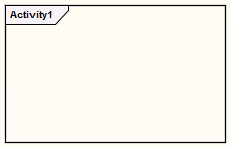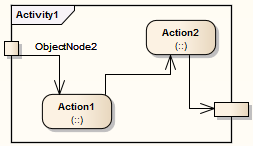Please note : This help page is not for the latest version of Enterprise Architect. The latest help can be found here.
Show Structural Elements In Composite Diagram
A Composite element shows the external relationships of the element with other components of the model and, via a child diagram, its own internal structure. You cannot normally add structural (embedded) elements to the representation of this internal structure; however, this procedure describes a modified process through which you can add embedded elements to the child diagram.
Embedded elements include:
| · | ActivityParameter |
| · | RequiredInterface |
| · | ActionPin |
| · | Port |
| · | EntryPoint |
| · | ExpansionNode |
| · | ObjectNode |
| · | ProvidedInterface |
| · | ExitPoint |
| · | Part |
Include embedded elements in a child composite diagram
Images |
Step |
Action |
See also |
|---|---|---|---|
|
1 |
Create the element to set as a Composite element. For example, a Class, Activity, or SysML Block.
|
|
|
2 |
Right-click on the element in the diagram and select the New Child Diagram | Composite Structure Diagram context menu option. The element redisplays with a small icon in the bottom right hand corner, indicating that this is now a Composite element.
|
|
|
3 |
Double-click on the Composite element to access the child diagram that it points to.
|
|
|
4 |
From the Project Browser, drag the Composite element itself onto the child Composite diagram, and paste it in as a Link. |
|
|
5 |
Right-click on the element in the diagram, and select the New Child Diagram | Show Composite Diagram in Frame context menu option. The element redisplays with a labeled frame around it. |
|
|
6 |
Press Ctrl+S to save the diagram. Right-click on the diagram tab and select the Reload <diagram name> context menu option. The diagram redisplays with just the frame showing. This frame represents the original composite element. |
|
|
7 |
Populate the frame with the appropriate internal elements, including the structured elements that attach to the frame itself. |
|













